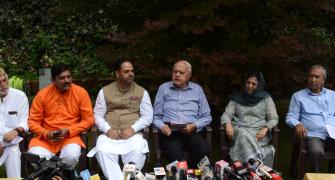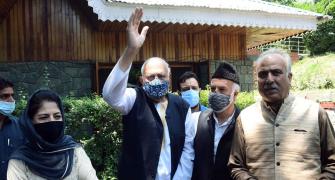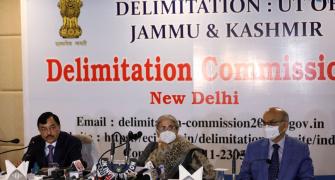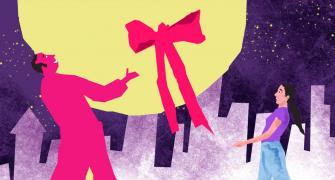'Ladakh too is politically paralysed and in limbo, as Rafale jets roar above Leh and Israeli arms dealers prowl the town.'
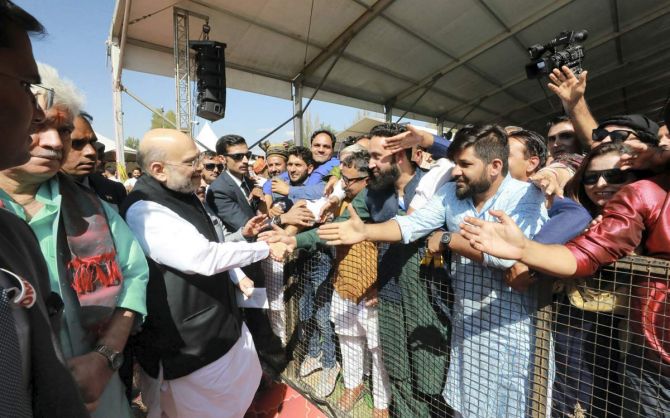
Sumantra Bose, a comparative political scientist, is a renowned expert on the Kashmir conflict.
His most recent book is Kashmir at the Crossroads: Inside a 21st-Century Conflict (Yale University Press and Picador India, 2021).
Bose describes to Aditi Phadnis the conditions in Kashmir and Ladakh, which he visited recently.
You are just back from Kashmir. From Delhi, it looks as if there is a democracy deficit. And yet, there's been a lot of development on the ground. What did you see?
I did not encounter any evidence of 'development,' at least not on the grand scale promised three years ago.
There is, however, a flourishing trade that has emerged, of lucrative contracts for projects being awarded to favoured business interests from outside Jammu and Kashmir.
Otherwise, there is institutional chaos as J-K has not adjusted to the radical surgery inflicted on it since August 2019.
As for the 'democratic deficit,' that’s a sanitised way of describing the surreal reality that exists.
There is an outcry about 'outsiders' being included in the voters' lists. This fear, of being swamped, is at the core of all Kashmiris, especially in the valley. How do you think political parties will react -- and mobilise?
The statement made by a senior official about potentially tens of lakhs of voters of non-J-K origin being added to the Union territory's electoral rolls is only the latest example of the tragi-comic farce that has passed for governance in Jammu and Kashmir for the past three years.
The statement has drawn predictable condemnation from parties such as the National Conference and the People's Democratic Party.
But these parties and their dynastic leaderships are totally discredited. They have very little mobilising capacity.
The brazenness of the statement simply reveals the lengths to which the architects of the August 2019 policy shift are prepared to go in pursuit of their 'Naya Kashmir'.
Jammu and Kashmir is no longer a state of the Indian Union, but all Indians should ponder this: Would the grant of voting rights to large numbers of people whose domiciles are clearly elsewhere be acceptable to the population in any state of India?
The writing down of Article 370 is a fait accompli. The courts will hear the case when they hear it. Politics has to move on. What is now the central political issue in Kashmir?
It is sad commentary on the Supreme Court that to date its honourable judges have failed to take up the two dozen petitions challenging the Constitutionality of the Jammu and Kashmir Reorganisation Act of August 2019.
This failure of the higher judiciary has facilitated the executive's strategy of criminalising and effectively outlawing all varieties of political opinion and activity -- barring one.
What has resulted is a strange limbo, a complete paralysis of political processes.
The institutional framework for such processes has been liquidated, and normal politics at the grassroots has been throttled by fear and persecution.
You are correct to say that in general, politics has to move on.
But in J-K today, that is not possible because the central aim of the strategy unveiled on August 5, 2019, has been to eliminate normal political processes at both institutional and grassroots levels.
I would say that the central political issue in J-K is precisely the restoration of normal politics -- with all its flaws and defects, as is the case everywhere in India.
But that is not something the Centre's strategy can permit, without derailing the entire strategy.
You've been to Ladakh too. What's the mood there?
I had interactions with local people in both Kargil and Leh districts.
The mood in both districts is sombre and sullen, and full of frustration and foreboding.
The Shia Muslims, who make up 80 per cent of Kargil district's population, never wanted Union territory status for Ladakh in the first place.
They have been seething for three years, and have empathy for the people of the Kashmir Valley.
But it is the Buddhists, who make up two-thirds of Leh district's population, who are the most disappointed and disillusioned community.
Ladakh no longer has any representative bodies worth speaking of, as the imposition of a disorganised UT administration run by bureaucrats sent from New Delhi has marginalised the elected local councils, which operated in Leh from 1995 and Kargil from 2003.
The Ladakhi Buddhists have not only been politically disempowered, they are living in great fear for their land rights, job prospects, and cultural integrity in the new order.
Meanwhile, the Chinese dragon is snarling on their doorstep.
The shared predicament of Ladakh's Buddhists and Muslims has led the two communities to converge on demands for an elected UT legislature, notification of the whole of Ladakh under the Sixth Schedule of the Constitution, which protects tribal peoples and their habitats, and, eventually, full statehood for Ladakh.
The present Centre seems to have no intention of responding to these aspirations.
So Ladakh too is politically paralysed and in limbo, as Rafale jets roar above Leh and Israeli arms dealers prowl the town.


